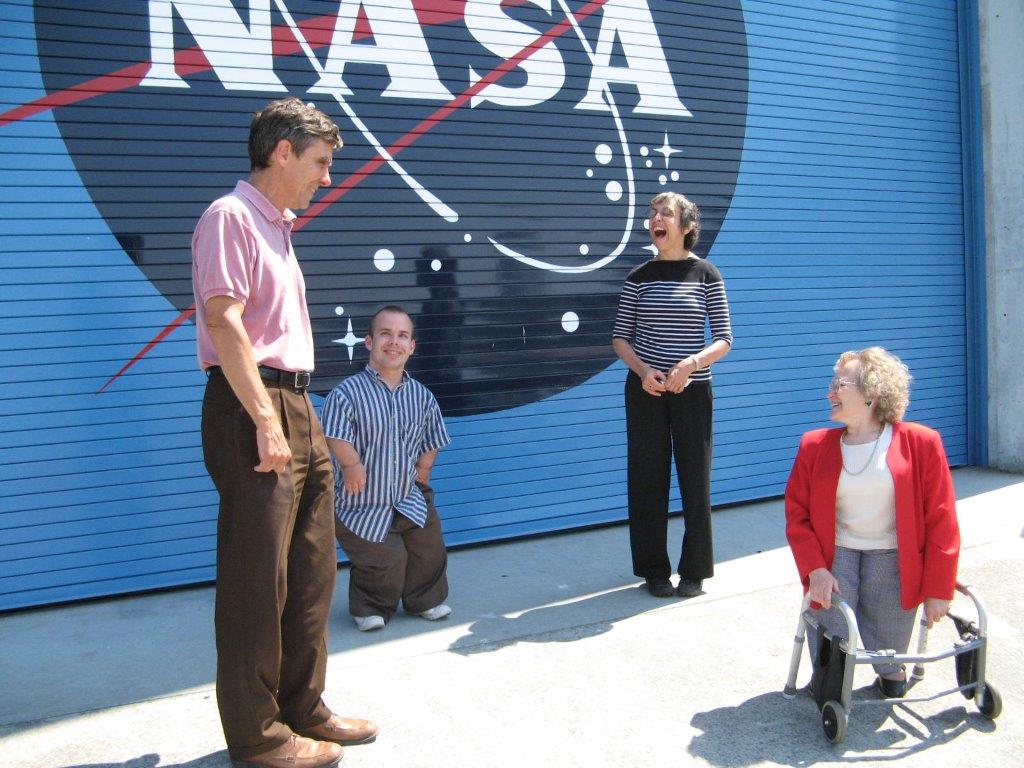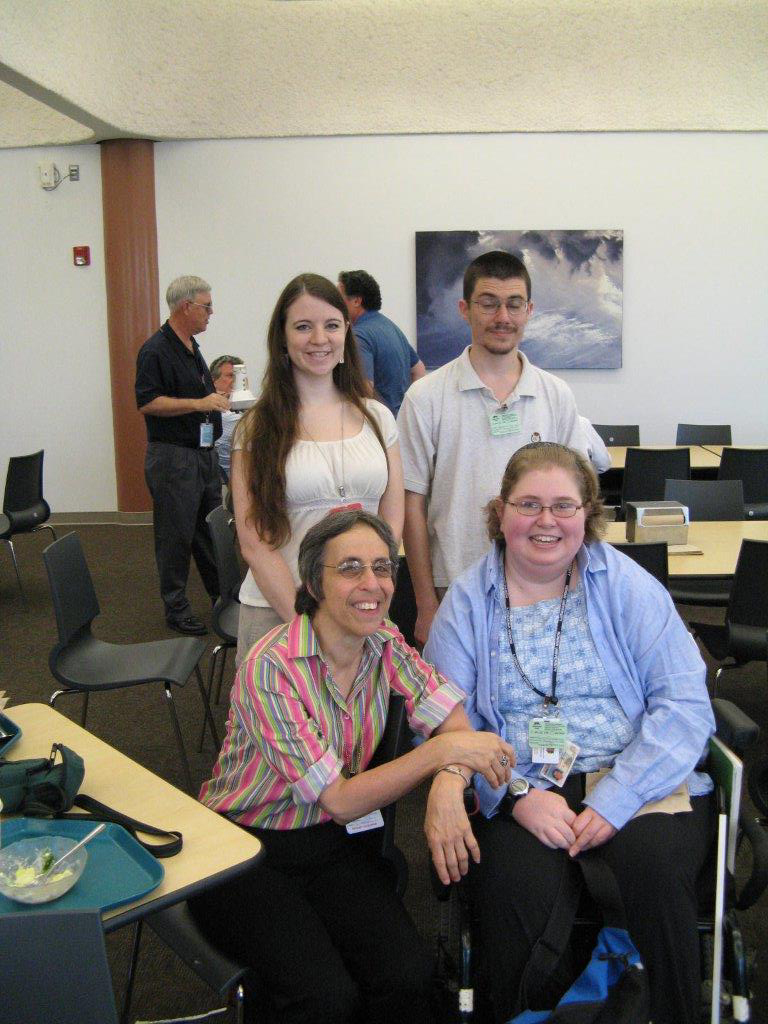Written by Laureen Summers
 Laureen Summers is Project Director for Entry Point!, a mentoring program for rising biomedical scholars and researchers with disabilities. Summers attended NRMN’s Partners in Action meeting at the headquarters of the Federation of American Societies for Experimental Biology (FASEB) in April, where she met individually with NRMN Executive Director Dr. Rafael E. Luna to discuss ways to activate a major initiative for NRMN to begin to mobilize support for the national community of biomedical researchers with disabilities. Summers and Luna agreed that a major component of this initiative would be to raise awareness and visibility of this community for the public, and to draw attention to contemporary opportunities and remaining challenges for persons with disabilities by “saying things no one has said before.”
Laureen Summers is Project Director for Entry Point!, a mentoring program for rising biomedical scholars and researchers with disabilities. Summers attended NRMN’s Partners in Action meeting at the headquarters of the Federation of American Societies for Experimental Biology (FASEB) in April, where she met individually with NRMN Executive Director Dr. Rafael E. Luna to discuss ways to activate a major initiative for NRMN to begin to mobilize support for the national community of biomedical researchers with disabilities. Summers and Luna agreed that a major component of this initiative would be to raise awareness and visibility of this community for the public, and to draw attention to contemporary opportunities and remaining challenges for persons with disabilities by “saying things no one has said before.”
Above: Summers with NRMN scientific society partners at April 2017 forum at the FASEB main campus in Bethesda, MD.
I have a personal passion for the biomedical field because of the challenges I have faced living with a physical disability. It was during my first internship at Mayo where I finally believed that I was able to have a career as a scientist without always being the disabled girl. The people in my lab kept telling me that I could do anything I wanted. My mentors have taught me that my potential is not limited by what my body can handle, and they encouraged me to believe that I was able to strive for further education. Because of this encouragement, I know I am able to be successful, even with a disability.”
AAAS Entry Point! former intern Rose Buchmann will be attending Cornell University to pursue a PhD in Biomedical Engineering. This summer, she will be working at New York Presbyterian Hospital in New York City through the clinical immersion program at Cornell.
Current national discussions among educators, science organizations, government and industry representatives address the impact of mentoring and encouraging people of color, women and other minorities to pursue degrees and careers in biomedical, behavioral, social and clinical science. Although issues of including and accommodating individuals with disabilities are implied, they often are not part of the direct conversation and remain greatly underrepresented in all levels of the biomedical curriculum and workforce.
 In an attempt to include and encourage more students with disabilities to pursue science and engineering, the American Association for the Advancement of Science (AAAS) launched the Entry Point! internship program, in 1996, to facilitate STEM career development and employment opportunities for persons with disabilities. By recruiting, screening, mentoring, and referring highly talented undergraduate and graduate students with disabilities to internship and co-op opportunities, program participants with disabilities have been able to follow a sustainable pathway to careers.
In an attempt to include and encourage more students with disabilities to pursue science and engineering, the American Association for the Advancement of Science (AAAS) launched the Entry Point! internship program, in 1996, to facilitate STEM career development and employment opportunities for persons with disabilities. By recruiting, screening, mentoring, and referring highly talented undergraduate and graduate students with disabilities to internship and co-op opportunities, program participants with disabilities have been able to follow a sustainable pathway to careers.
Shown above, left: Entry Point! site visit at NASA’s Ames Research Center.
Entry Point!, with partners in government, private industry and universities, has placed more than 600 undergraduate and graduate students with disabilities in summer opportunities. 85 percent of alumni have secured employment in a science field. Some are individuals with significant disabilities. Others have hidden disabilities, such as learning, health or emotional conditions. Approximately one-third are African American. More than 100 alumni have shared an interest in becoming role models and mentors for new program applicants.
During the past three years, companies, medical institutions, and university research programs have expressed desires to diversify their pool of interns by seeking students with disabilities majoring in biomedical science and engineering. A prerequisite is that the applicants be on a Ph.D/MD track. The mentoring program, offered by NRMN (https://nrmnet.net/about-nrmn- 2/), can be one of the most influential factors for engagement and progress toward a professional biomedical career.
Shirley Malcom, Head of the AAAS Education and Human Resources Division, states:
“The transitions from college to graduate work in science and from education to career are critical junctures. This is especially the case for students with disabilities who need strong networks and connections to overcome persistent barriers, both attitudinal and physical.”
 In 2010, AAAS brought together a group of established scientists and engineers for a two-day conference: “The Problem Solvers”. Participants discussed how coping with a disability adds another layer to the education and career experience. They discussed the influence of parents, role models, teachers and sensitive mentors, in helping to figure out creative ways of dealing with everyday challenges. By their junior and senior college years, students with disabilities often have already tested a variety of technologies from adapted computer software and programs to screen readers, speech recognition systems and newly-designed classrooms and laboratories, and understand what is needed to successfully participate in a scientific environment.
In 2010, AAAS brought together a group of established scientists and engineers for a two-day conference: “The Problem Solvers”. Participants discussed how coping with a disability adds another layer to the education and career experience. They discussed the influence of parents, role models, teachers and sensitive mentors, in helping to figure out creative ways of dealing with everyday challenges. By their junior and senior college years, students with disabilities often have already tested a variety of technologies from adapted computer software and programs to screen readers, speech recognition systems and newly-designed classrooms and laboratories, and understand what is needed to successfully participate in a scientific environment.
Shown above, right: Laureen Summers with NASA interns.
A partnership with NRMN would offer additional resources to the students pursuing a biomedical or related science field. In addition to learning about the variety of technology and other accommodations, the NRMN program also focuses on culturally responsive mentoring. The importance of addressing the social and family experiences of students with disabilities is not always recognized. Yet these experiences determine many self-efficacy issues and need to play a role in the mentoring process. Through mentor training and professional development opportunities, NRMN develops a network of strong, supportive individuals who are sensitive to the mentees experiences, while providing encouragement and goals that can drive the student towards success in the biomedical sciences field.
Entry Point! has been funded through annual partnership fees from government, industry, and university internship programs. With proposed cuts in research and education departments, the program is now reaching for ways to secure new funding sources. Through partnering with NRMN, Entry Point! hopes to attract new partners seeking to diversify their pool of students who are pursuing degrees in the biomedical and social sciences fields. The Entry Point! portfolio will be expanded by recruiting and referring qualified students with disabilities, from colleges and universities that focus on biomedical and social sciences to the NRMN network offering mentoring opportunities as a pathway to graduate work and careers.
For more information, please visit www.aaas.org/entrypoint.

Contact:
Laureen Summers
lsummers@aaas.org
202-326- 6649